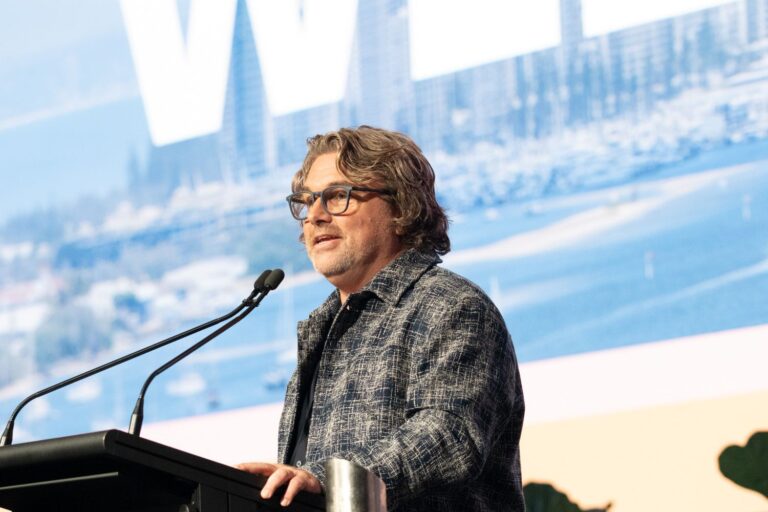[ad_1]
Questions over Donald Trump’s tariff threat loomed large on the first day of Screen Forever on the Gold Coast, as the president’s social media post reverberated around the industry.
On Sunday US time, Trump used Truth Social to bemoan the “slow death” of the US film industry, before claiming to have authorised the Department of Commerce and the United States Trade Representative to begin the process of putting a 100 per cent tariff on feature films coming into the US that were produced on “foreign lands”.
The potential ramifications of such a move have drawn much debate since, none more so than in the US itself, where major studios have reportedly been blindsided. Trump said on Monday (US time) he would speak to representatives from the US business to discuss the plan.
It’s the second time in three years that Screen Producers Australia’s (SPA) Screen Forever conference has taken place against the backdrop of potential upheaval from the US – in 2023, it was held days after the Writers Guild of America called its 2023 strike.
“The US Administration’s aggressive stance on trade and tariffs has emboldened entities like the MPA [Motion Picture Association] and the global streamers they represent – but the Australian Government has stood firm under this pressure and, of course, must continue to do so,” said SPA CEO Matthew Deaner in his opening address to delegates.
“This is about more than us – it’s about the ongoing role of the Australian story in our lives. And it’s not just Australia, of course. Right now, SPA is working with its international counterparts on a statement to repudiate the notion that commercial interests should determine a nation’s control of its cultural sovereignty.”
Trump was also on the agenda in a subsequent session titled State of Play, featuring Hoyts Group CEO Damian Keogh, Foxtel director of content and channels Wendy Moore, Stan chief content officer Cailah Scobie, and Madman Entertainment CEO Paul Wiegard.


When moderator Virginia Trioli asked Scobie if she took the threat seriously, Scobie said that at the heart of Trump’s concern was whether or not there should be more studio films produced in the US, given that films can be produced cheaper elsewhere.
“I guess fundamentally, the question is, if that is the problem that is trying to be solved, or that the US government is trying to address, what is the best way to do that?” she said.
“I think there have been numerous articles over the last 24 hours, suggesting that perhaps tariffs wouldn’t be the right way, and there could be a lot of unintended consequences that could result from that. Also that what a tariff doesn’t do is address the primary problem of the cost of production in the US, and perhaps an incentive would better way to address that.”
Keogh said there was a “bit of naivety” to the plan, given how global the industry was.
“[With] a lot of the feature films that are made here by US studios, there is a whole lot of post-production, mixing, and graphics done in different countries, so how would it apply? What would it apply to? Just movies or TV series as well? It’s topical to talk about it, but I think we’re all better off ignoring it until we know more.”
The comments come as membership organisation Ausfilm, which promotes Australia as a destination for international film and TV production, weighed in on the matter.
In a statement to IF, CEO Kate Marks said it had “a long and mutually beneficial history of collaborating with the US and other global partners”.
“We are closely monitoring the situation and awaiting further details, and will continue to work with our industry and government partners,” she said.
[ad_2]
Source link

